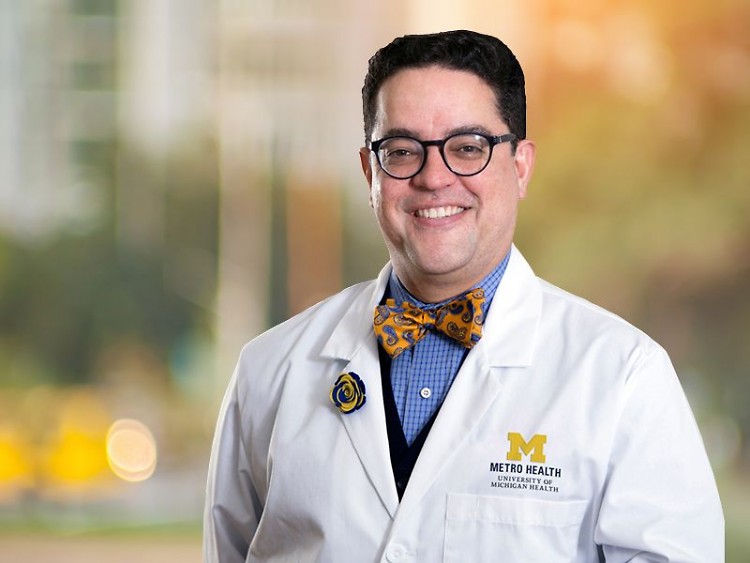Metro Health – University of Michigan Health cardiologist, Dr. Larry Diaz, a native of Venezuela, says Hispanics are at a higher risk of health conditions that could lead to heart disease, and he’s committed to spreading awareness. “During American Heart Health Month in February, we make sure our message about heart disease is loud and clear, but 365 days a year we have an opportunity to encourage people to visit their doctor to reduce their risk,” he says.
The Hispanic community has high incidences of diabetes, high blood pressure, obesity, high cholesterol and smoking. Even one of these factors puts them at risk of a heart attack or a stroke. Additionally, many Hispanics have a family history of heart attack, heart disease or stroke, which adds another layer of risk. “All of this sounds very serious, but it’s never too late to change your habits and reduce your risk,” Dr. Diaz emphasizes.
Because heart disease is a multifactorial condition, there isn’t one single cause, therefore there are multiple ways to address it. Dr. Diaz believes the first, and most important factor is diet. “We need to educate children as young as five-years-old about healthy food choices. To be specific, Dr. Diaz suggests, “There needs to be an emphasis on limiting dough-based foods like tortillas, rice and tamales to one serving a day. We should also limit saturated fats and increase servings of lean protein and select fruits with low sugar content (low “glycemic index”).”
As part of West Michigan’s Hispanic community, Dr. Diaz knows how ingrained diet habits are into everyday culture and expectations, and changing those habits isn’t always easy. “We’re not asking you to stop eating the foods that are an integral part of your culture, we’re suggesting that you start by decreasing your daily intake from multiple servings to one. Also, take steps to ensure every meal of the day doesn’t include red meat. Simple changes like this go a long way in improving your overall health and risk of heart disease.”
A second factor Dr. Diaz addresses with his patients is physical activity. Again, he believes children as young as five should be educated about the importance of participating in at least an hour of physical activity a day. “We live in a sedentary society where children and adults are glued to their screens,” he says. “If parents prioritize physical activity and model it themselves, it’s more likely their children will value it as well.”
Dr. Diaz understands that for adults who struggle to be physically active, it can be a vicious cycle. “Those who are overweight or obese often find it difficult to exercise because of the stress it puts on their body. If they have bad knees due to excess weight, moving around may be painful. So, they stop moving, which continues to put them at greater risk.”
If this sounds like you, Dr. Diaz wants you to know, you’re not alone. Help is available at Metro Health. “I understand that pride gets in the way of seeking help. I understand language barriers elicit feelings of shame and embarrassment. At Metro Health, I speak Spanish and we have other physicians and staff who do as well, and we have a readily available interpreter service.” He continues, “There are complex emotions at play here, but that shouldn’t make you close the door to care. I understand what you’re going through and where you’re coming from, and our team is here ready to help you.”
The first step to better health is visiting your primary care physician, or Dr. Diaz, to determine your risk factors. From there, follow your doctor’s recommendations to reduce those risk factors. “We have the knowledge, technology and the tools to fix problems, but the longer you wait the more difficult the fix becomes. The earlier we address it, the better quality and longer life you will have.”
The Rapidian, a program of the 501(c)3 nonprofit Community Media Center, relies on the community’s support to help cover the cost of training reporters and publishing content.
We need your help.
If each of our readers and content creators who values this community platform help support its creation and maintenance, The Rapidian can continue to educate and facilitate a conversation around issues for years to come.
Please support The Rapidian and make a contribution today.
